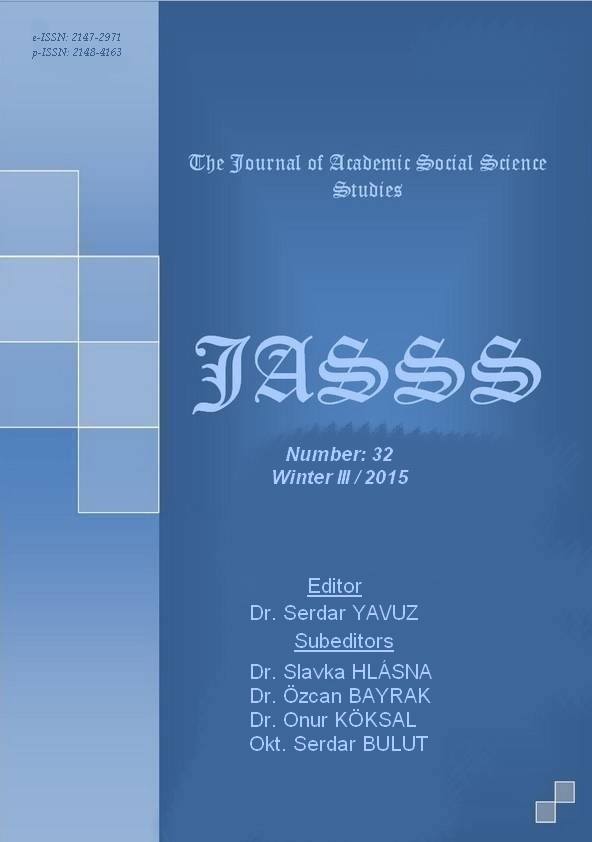Author :
Abstract
Bu araştırmada, Kıbrıs’ta çözümle ilgili olarak ortaya çıkan Gali (1992) ve Annan (2004) planlarının temel özellikleri ele alınmıştır. Buradan hareketle araştırmanın temel amacı, Kıbrıs’ta taraflar arasında cereyan eden görüşmelerde Gali ve Annan planlarının ortaya koyduğu temel özelliklerinin neler olduğu, tarafları nasıl etkilediği veya uygulama basamaklarının nasıl olacağı incelenmiştir. BM’nin 1959 Zürih ve Londra Antlaşmalarından sonra Kıbrıs’a bakış açısıyla, toplumlararası çatışmaların başlamasından sonraki bakışı bir değildir. Bundan böyle BM, meseleye müdahil olmak zorunda kalmıştır. 1992 yılından sonraysa Kıbrıs’taki taraflar, toplumlararası görüşme stratejisinde birtakım değişiklikler yapmışlardır. Türk tarafı, Kıbrıs meselesinin uluslararası forumlara götürülmeksizin Ankara ve Atina’nın desteğinde ve toplumlararası görüşmeler yoluyla çözümlenmesini istemiştir. Rumlarsa toplumlararası görüşmelerin kesilmesinden ve Kıbrıs meselesinin uluslararası forumlara taşınmasından yana olmuşlardır. Böylece toplumlararası görüşmelerin tabiî süreci, BM’den ziyade, AB nezdinde gelişmeye başlamıştır. Buna karşın anayasa, toprak, siyasal statü, egemenlik, mülkiyet, self-determinasyon ve garantiler ile ilgili ‘bir bütün olan Kıbrıs meselesinin, ‘mini paketlerle’ çözülemeyeceği anlaşılmıştır. Bundan hareketle Kıbrıs’ta gerçekçi olmayan çözüm önerilerinden, baskılardan ve buna dayalı mini paket yöntemlerinden, özellikle uzak durmak gerekecektir. Bununla ilgili olarak Kuruluş Anlaşması’nda ve Kapsamlı Çerçeve Anlaşması’nın diğer bölümlerinde belirtilen hükümler, Kıbrıs’ta kurulması düşünülen barışın esasını oluşturmaktadır. Dolayısıyla sorunun bütün yönlerini kapsayan ve özenle hazırlanan çerçeve, ilk bakışta karışık gibi olsa da üzerinde her iki tarafın mutabık kalması hâlinde, Kıbrıs’ta kalıcı bir barışın sağlanması mümkün olacaktır. Ancak her hususta anlaşılmadıkça, özellikle peyderpey uygulamaya gitmek, Türk tarafının siyasal pozisyonunda erozyona neden olacağı için dikkatli olunmalıdır. Rum tarafının, Kıbrıs meselesini bir ‘ödünler sistemi’ olarak görmesi ve bu sistemin temel taşlarından başlıcalarını yerinden çekip çıkarması, Kıbrıs’a kalıcı bir barışı getirmeyecektir. Bu gerçekten hareketle araştırma, iki ana bölümden oluşmaktadır. Birinci bölümde Gali Fikirler Dizisi’nin, ikinci ve son bölümde ise Annan Planı’nın temel özellikleri ele alınmıştır.
Keywords
Abstract
In this research, the main features of Ghali (1992) and Annan (2004) Plans, which emerged in relation to a solution in Cyprus, have been addressed. From this point, the main aim of this research is to analyze main features, impacts on the parties and the implementation steps of Ghali and Annan Plans, which are coming out during the negotiations between parties in Cyprus. UN’s view on Cyprus following the 1959 Zurich and London Agreements is not identical with its view after the beginning of inter-communal conflicts. From then on, UN was compelled to be become a party in this conflict. Parties in Cyprus, however, made several changes in their strategies of inter-communal dialogues after 1992. Turkish side seeks a solution to Cyprus issue through inter-communal dialogs among parties without submission the issue to international forums, but assisted by Ankara and Athens. The Greek side, on the other hand, has stand with the end of inter-communal dialogues and with the carrying Cyprus issue into the international forums. Consequently, the natural process of inter-communal dialogues has started to continue through EU platforms, rather than UN mechanisms. Conversely, it was understood that a solution for Cyprus issue is not possible through ‘micro packets’ since it requires a total approach which includes issues of constitution, territory, political statue, sovereignty, property rights, self-determination and guarantees. Therefore, it should be necessary to avoid unrealistic solution proposals, pressures and micro packets based on such proposals. Provisions in the Treaty Concerning The Establishment of The Republic of Cyprus and the Overall Framework Agreement on Cyprus form the basis of the peace in Cyprus. For this reason, the well prepared framework, which involves all dimensions of the problem, presents an opportunity to establish permanent peace in Cyprus if both sides agree though it seems complicated at first glance. However, it is important to be careful due to the fact that the gradual implementation without an agreement for each and every subject may lead to a political erosion of the Turkish side. Accordingly, the Greek perception that the Cyprus issue is ‘a concession system’ and its attempts to take some of the main blocks of the process will not bring a permanent peace in Cyprus. Based on this fact, this research consists of two main sections. Ghali’s Set of Ideas in the first section and Annan Plan in the second one have been addressed.





